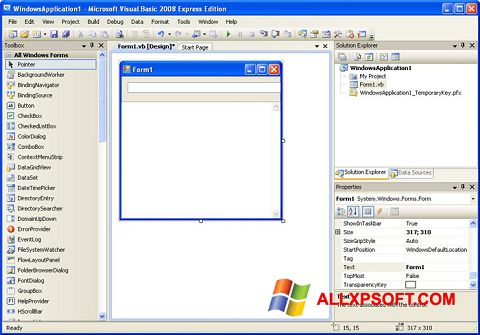

- #Microsoft visual basic download win 7 64bity update#
- #Microsoft visual basic download win 7 64bity code#
#Microsoft visual basic download win 7 64bity code#
The Vba7 conditional compiler constant is used to determine if code is running in version 7 of the VB editor (the VBA version that ships in Office 2010). To write code that can work in both new and older versions of Office, you can use a combination of the new VBA7 and Win64 conditional Compiler constants. Writing code that works on both Office 2010 (32-bit or 64-bit) and previous versions of Office Note that if you require different logic to execute, for example, you need to manipulate 64-bit values in large Excel projects, you can use the Win64 conditional compilation constant as shown in the following section. The LongPtr type alias will resolve to the correct Long or LongLong data type depending on which version of Office is running. To write code that can port between both 32-bit and 64-bit versions of Office, you only need to use the new LongPtr type alias instead of Long or LongLong for all pointers and handle values. Writing code that works on both 32-bit and 64-bit Office
#Microsoft visual basic download win 7 64bity update#
Additionally, you must update any user defined types (UDTs) that contain pointers or handles and 64-bit integrals to use 64-bit data types, and verify that all variable assignments are correct to prevent type mismatch errors. You also need to locate and modify all data types within these Declare statements that reference handles or pointers to use the new 64-bit compatible LongPtr type alias, and types that need to hold 64-bit integrals with the new LongLong data type. In summary, for code to work in 64-bit versions of Office, you need to locate and modify all existing Declare statements to use the PtrSafe qualifier. To reiterate, you must modify the Declare statement to include the PtrSafe qualifier, and you must update any variables within the statement that need to hold 64-bit quantities so that the variables use 64-bit data types.įollowing is a VBA Declare statement example that is modified to include the PtrSafe keyword and is updated to use the proper 64-bit ( LongPtr) data type: Declare PtrSafe Function GetActiveWindow Lib "user32" () As LongPtr The following VBA Declare statement example is modified to include the PtrSafe qualifier but still use a 32-bit return value: Declare PtrSafe Function GetActiveWindow Lib "user32" () As Long But because the return value has not been updated to a 64-bit data type, the return value is truncated, resulting in an incorrect value returned.įollowing is an unmodified legacy VBA Declare statement example: Declare Function GetActiveWindow Lib "user32" () As Long The PtrSafe qualifier tells the compiler that the Declare statement is targeting 64-bits, so the statement executes without error. On 64-bit Office, this is incorrect because the pointer needs to be 64-bits. The modified VBA example contains the PtrSafe qualifier, but notice that the return value (a pointer to the active window) returns a Long data type. Running the unmodified Declare statement in 64-bit versions of Office will result in an error indicating that the Declare statement does not include the PtrSafe qualifier. To ensure backwards compatibility in VBA7 and earlier use the following construct: #If VBA7 ThenĬonsider the following Declare statement examples. Declare statements that include PtrSafe work correctly in the VBA7 development environment on both 32-bit and 64-bit platforms.

The PtrSafe keyword asserts that a Declare statement is safe to run in 64-bit versions of Office.ĭeclare statements with the PtrSafe keyword is the recommended syntax. Implicit conversions of LongLong to smaller integrals are not allowed. Conversion functions must be used to explicitly assign LongLong (including LongPtr on 64-bit platforms) to smaller integral types. The LongLong data type is a signed 64-bit integer that is only available on 64-bit versions of Office. The actual data type that LongPtr resolves to depends on the version of Office that it is running in LongPtr resolves to Long in 32-bit versions of Office, and LongPtr resolves to LongLong in 64-bit versions of Office. VBA now includes the variable type alias LongPtr. Three important additions are the LongPtr type alias, the LongLong data type, and the PtrSafe keyword. The table at the bottom of this document summarizes the new VBA language features. To address this problem and enable VBA code to work correctly in both 32-bit and 64-bit environments, several language features have been added to VBA. This can result in memory overruns, unexpected results in your code, and possible application failure. The problem with running legacy VBA code in 64-bit Office is that trying to load 64-bits into a 32-bit data type truncates the 64-bit quantity. You only need to modify VBA code if it runs in the 64-bit version of Microsoft Office.


 0 kommentar(er)
0 kommentar(er)
